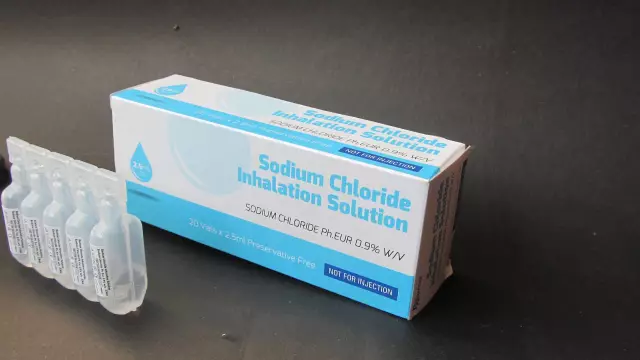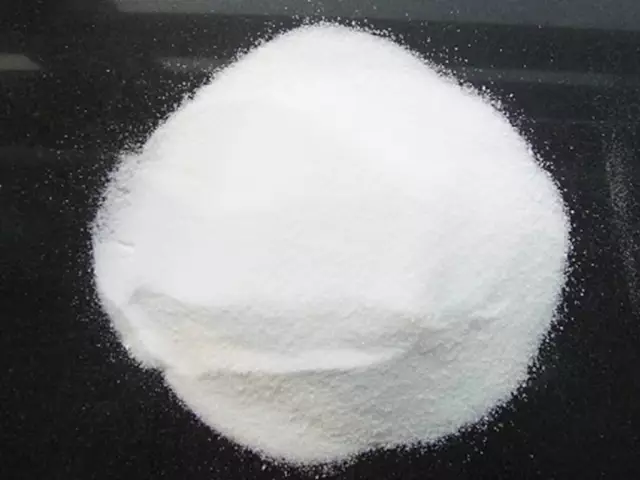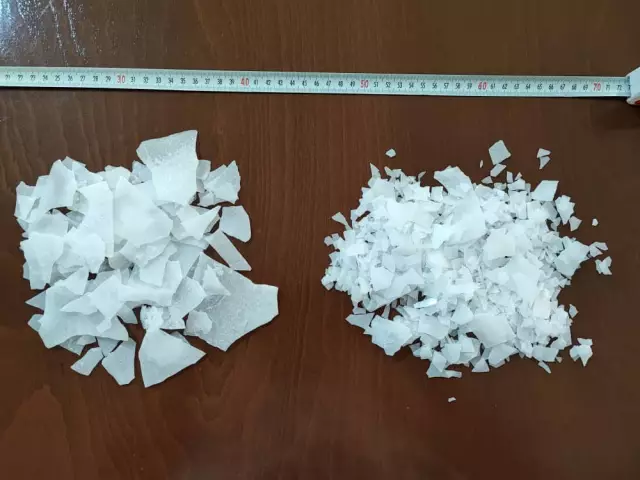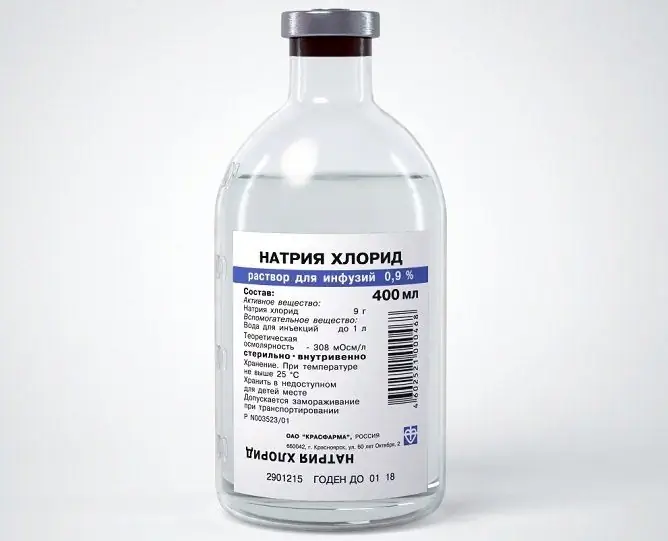- Author Rachel Wainwright wainwright@abchealthonline.com.
- Public 2023-12-15 07:39.
- Last modified 2025-11-02 20:14.
Thiamine chloride
Thiamine chloride: instructions for use and reviews
- 1. Release form and composition
- 2. Pharmacological properties
- 3. Indications for use
- 4. Contraindications
- 5. Method of application and dosage
- 6. Side effects
- 7. Overdose
- 8. Special instructions
- 9. Application during pregnancy and lactation
- 10. Use in childhood
- 11. Drug interactions
- 12. Analogs
- 13. Terms and conditions of storage
- 14. Terms of dispensing from pharmacies
- 15. Reviews
- 16. Price in pharmacies
Latin name: Thiamine chloride
ATX code: A11DA01
Active ingredient: thiamine (thiamine)
Manufacturer: JSC "Yerevan Chemical-Pharmaceutical Firm" (Armenia), JSC "Moskhimpharmpreparaty named after N. A. Semashko "(Russia), DALHIMFARM (Russia)
Description and photo update: 2018-22-10
Prices in pharmacies: from 28 rubles.
Buy

Thiamine chloride is a vitamin B1 preparation.
Release form and composition
Dosage form - solution for intramuscular (i / m) administration: a clear liquid, slightly colored or colorless, with a characteristic faint odor (1 ml or 2 ml in an ampoule, 10 pcs in a cardboard box; 5 pcs in a blister, in a carton box 1 or 2 packs)
1 ml of solution contains:
- active substance: thiamine hydrochloride - 50 mg;
- auxiliary components: disodium edetate, unitiol (sodium dimercaptopropanesulfonate monohydrate), water for injection.
Pharmacological properties
Pharmacodynamics
Thiamine chloride is intended to compensate for the deficiency of vitamin B 1 in the body.
Vitamin B 1 (thiamine) dissolves in water, in the process of phosphorylation in the body it turns into cocarboxylase, which participates in many enzymatic reactions as a coenzyme. Vitamin B 1 is necessary for the body to ensure the normal metabolism of carbohydrates, proteins and fats, the processes of conducting nervous excitation in synapses.
Pharmacokinetics
The level of thiamine concentration in the blood is relatively low, mainly free thiamine circulates in plasma, and its phosphorus esters circulate in erythrocytes and leukocytes.
The process of phosphorylation of the vitamin is carried out in the liver. The phosphate ester thiamine diphosphate has coenzyme activity. The accumulation of thiamine mainly occurs in the liver, brain, heart, kidneys, spleen. The myocardium and striated muscles contain 50% of the total, in the internal organs - 40%.
It is excreted through the kidneys and intestines.
Indications for use
The use of Thiamine chloride is indicated for vitamin deficiency and hypovitaminosis B 1 and as part of the complex therapy of the following diseases:
- violation of the coronary circulation;
- myocardial dystrophy;
- radiculitis, neuritis of various origins, neuralgia;
- peripheral paresis, paralysis;
- ulcers of the stomach and duodenum;
- intestinal atony, anorexia, atonic constipation;
- eczema, psoriasis, neurodermatitis, lichen planus and other dermatological pathologies associated with metabolic disorders and neurotrophic changes.
Contraindications
- period of pregnancy;
- breast-feeding;
- childhood;
- hypersensitivity to the components of the drug.
Thiamine chloride should be prescribed with caution in Wernicke's encephalopathy, in the premenopausal and climacteric periods.
Instructions for the use of thiamine chloride: method and dosage
The solution is used parenterally by deep intramuscular injection.
It is recommended to make the first injection of the drug in a dose of no more than 0.5 ml of solution. Further, with good tolerance, higher doses can be used.
The dose and the period of treatment are prescribed by the doctor, taking into account clinical indications.
Recommended dosage: 20-50 mg of thiamine chloride or 0.5-1 ml of solution 1 time per day. The course of treatment can be from 10 to 30 days.
Side effects
Against the background of the use of Thiamine chloride, the appearance of increased sweating, tachycardia, the development of allergic reactions in the form of itching, urticaria, Quincke's edema, anaphylactic shock are possible; at the injection site - a feeling of pain.
Overdose
Overdose symptoms have not been established.
special instructions
Parenteral administration of the drug is recommended only in cases where the patient is unable to take vitamins orally (including the period before and after surgery, nausea, vomiting and malabsorption syndrome).
It should be borne in mind that high doses of thiamine can distort the results of studies with a spectrophotometric method for determining the level of theophylline in serum or when using Ehrlich's reagent to determine the content of urobilinogen.
Anaphylactic reaction often occurs with high doses of intravenous administration.
According to the instructions, Thiamine chloride for Wernicke's encephalopathy should be administered only after the use of dextrose.
Application during pregnancy and lactation
The use of thiamine hydrochloride is contraindicated during gestation and lactation.
Pediatric use
Do not use the drug solution to treat children.
Drug interactions
With simultaneous parenteral administration with thiamine chloride:
- pyridoxine (vitamin B 6): complicates the process of converting thiamine into a biologically active form, increases the risk of developing allergic reactions;
- cyanocobalamin (vitamin B 12): enhances the allergenic effect of thiamine;
- phentolamine, suxamethonium iodide, propranolol, hypnotics, sympatholytics (reserpine): reduce their pharmacological activity.
The drug should not be mixed in the same syringe with benzylpenicillin, streptomycin, nicotinic acid and sulfite-containing solutions.
It is not recommended to prescribe thiamine in combination with barbiturates, carbonates, citrates, copper preparations.
The drug is unstable in neutral and alkaline solutions.
Analogs
The analogs of Thiamine chloride are Vitamin B 1, Vitamin B, Aneurin, Aneuril, Benerva, Betabion, Benevrin, Berin, Betamin, Betaxin, Betiamin, Betanevrin, Bevital, Bevitin, Orizanin, Cristovibeks, Vitaplex Bi, Neurovitan, Folic acid, Folic acid, acid.
Terms and conditions of storage
Keep out of the reach of children.
Store at a temperature of 0-25 ° C in a dark place.
The shelf life is 3 years.
Terms of dispensing from pharmacies
Dispensed by prescription.
Reviews of Thiamine Chloride
Reviews of Thiamine Chloride are only positive. They point to the high efficiency of the vitamin preparation in the treatment of neurological diseases, exacerbation of gastric ulcer, impaired coronary circulation and skin pathologies. Its use as part of complex therapy contributes to providing the body with the necessary energy and activating the recovery processes. Women share their impressions of the positive effect of the drug when using it for hair care.
Price for Thiamine chloride in pharmacies
The price of Thiamine chloride for a pack containing 10 ampoules of 1 ml is approximately 28 rubles.
Thiamine chloride: prices in online pharmacies
|
Drug name Price Pharmacy |
|
Thiamine chloride 50 mg / ml solution for intramuscular administration 1 ml 10 pcs. 28 RUB Buy |
|
Thiamine chloride 50 mg / ml solution for intramuscular administration 1 ml 10 pcs. RUB 33 Buy |

Anna Kozlova Medical journalist About the author
Education: Rostov State Medical University, specialty "General Medicine".
Information about the drug is generalized, provided for informational purposes only and does not replace the official instructions. Self-medication is hazardous to health!






